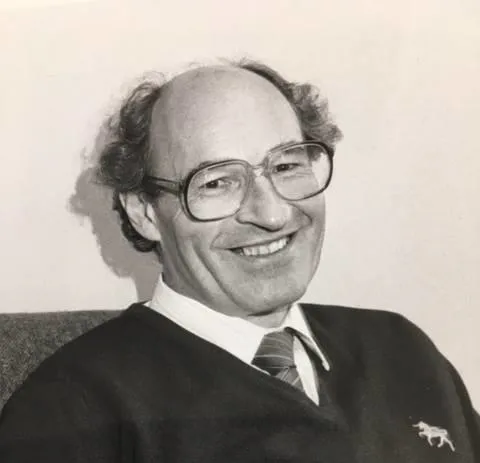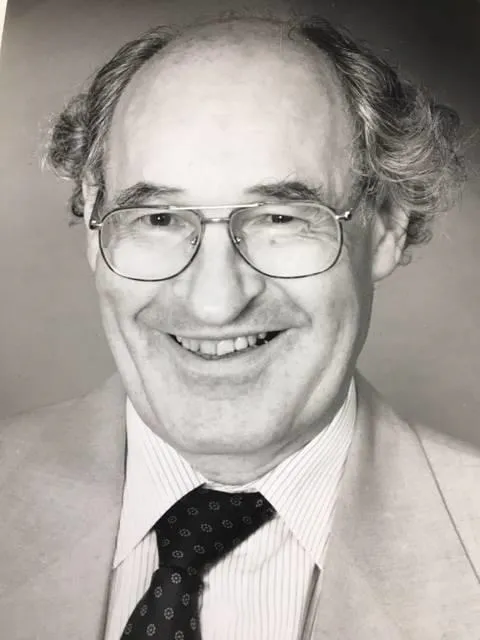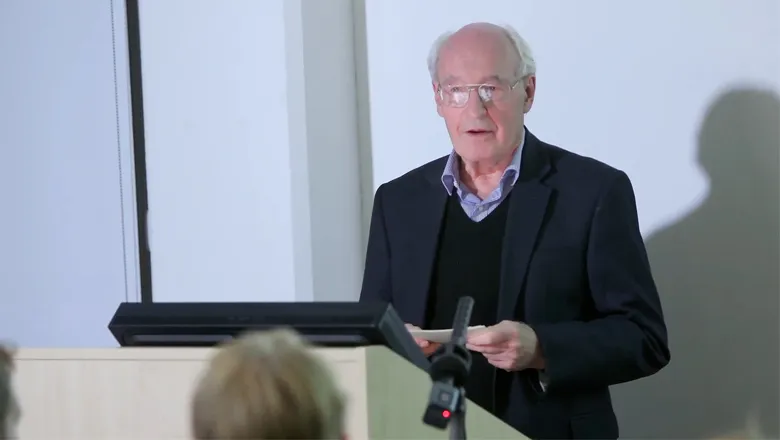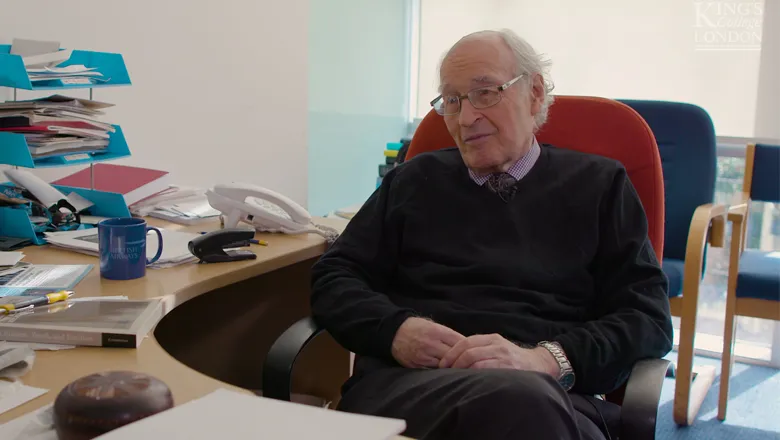Research is addictive – addictive because you find out what you didn’t know and what you may never even have imagined
Professor Sir Michael Rutter
12 July 2021
Professor Sir Michael Rutter retires after 55 years at the IoPPN
Professor Sir Michael Rutter is retiring from the Institute of Psychiatry, Psychology & Neuroscience (IoPPN) at King’s and receiving an Emeritus Professor title after working at the Institute for 55 years.
Professor Sir Michael Rutter’s extraordinary career is an inspiration to many, laying the foundations of Child Psychiatry and Developmental Psychopathology. Throughout his career he has published upwards of 400 empirical articles and 40 books, many of which have had a lasting impact on our understanding of child development. He is now regarded as the ‘father of Child Psychiatry’, paving the way for developmental psychologists and psychiatrists.
To celebrate this extraordinary career, some of Sir Michael’s colleagues, collaborators, and friends have shared their experiences of working with Sir Michael in the following short video:
Professor Sir Michael Rutter’s ground-breaking research has inspired an entire field of scientific endeavours as well as generations of child psychiatrists and academics and our students arrive having read about his pioneering work in their studies.
Professor Cathryn Lewis, Head of Department at the Social, Genetic and Developmental Psychiatry Centre
An extraordinary and rich research career

Sir Michael trained in medicine at the University of Birmingham, England, with post-graduate training in neurology and paediatrics. He trained in psychiatry at the Maudsley Hospital and started working at the (then) Institute of Psychiatry (IoP) in 1966. In 1973, he was awarded the first UK Professorship in Child Psychiatry. He went on to become Head of the Department of Child and Adolescent Psychiatry and was awarded a professorship in Developmental Psychopathology in 1998, a position he has continued to hold for 23 years.
In 1984, the Medical Research Council set up the MRC Child Psychiatry Research Unit, with Sir Michael appointed as its Director. When the Social, Genetic and Developmental Psychiatry (SGDP) Centre was set up in 1994 as a partnership between IoP and the MRC, Sir Michael was appointed as its first director. The centre, which is now home to 86 staff and over 100 students, promotes an interdisciplinary and collaborative research approach, focusing on how genetics (‘nature’) and the environment (‘nurture’) interact to affect psychiatric disorders, neurodevelopmental conditions and individual differences across development.
It was a huge honour to take over from Michael as Director of the SGDP on his ‘first retirement’ from clinical work in 1998. The Centre was the joint brainchild of Michael, Professor Sir David Goldberg, Head of IoP Psychiatry Department and Sir George Radda, CEO of the MRC. All three wanted to further the study of environmental factors in psychiatry alongside the rapid recent advances in genetic and developmental research. I witnessed the dramatic initial flourishing of the Centre as a member of its original MRC steering committee and am proud of the science made possible by the dedication of the staff and students there
Professor Emeritus Peter McGuffin, former Dean of IoP and former Director of the SGDP Centre

Sir Michael has been the recipient of numerous awards and positions. He was elected as a Fellow of the Royal Society in 1984. He was knighted in 1992 for his contributions to the field of Child Psychiatry. In 2004, Sir Michael was awarded the Society of Clinical Child and Adolescent Psychology Distinguished Career Award by the American Psychological Association for his major contributions to public policy and scientific practice. He also held positions as the Deputy Chairman of the Wellcome Trust, Trustee of the Nuffield Foundation, Founding Fellow of the Academy of Medical Sciences and Academia Europaea, and President of YoungMinds, the UK’s leading charity for young people’s mental health.
The Michael Rutter Centre for Children and Adolescents was set up at Maudsley Hospital and developed an international reputation for providing services and specialist treatments for young people with mental health difficulties.
Pioneering research and breakthroughs
Sir Michael has been credited with numerous breakthroughs within his field. He made major advances in our understanding of autism, and in the 1970s, his twin study showed for the first time that autism was a strongly genetically influenced disorder (which has been confirmed by more recent molecular genetic studies). He pioneered the science of child resilience and had an eye for once-in-a-lifetime natural experiments. Some of the influential studies he is best known for include his early epidemiological studies and the English and Romanian Adoptee study - some of which continue to form the basis of empirical articles today.

The ‘Isle of Wight’ and ‘Inner London’ studies
Early in his career, Sir Michael established the ‘Isle of Wight’ and ‘Inner London’ studies - two pioneering epidemiological studies which investigated the psychological well-being and educational attainment of primary school children in contrasting urban and rural environments. These studies became the cornerstones of child psychiatric epidemiology, formed jumping-off-points for longitudinal studies in adulthood, and provided the evidence for service planning to meet children’s needs. Since well-being and attainment differed hugely between primary schools, Sir Michael also proposed for the first time that schooling quality helped shape child development.
As a result, he published the book Fifteen Thousand Hours - an interdisciplinary collaboration between researchers and teachers which followed-up children in inner London from ages 10 to 16 to investigate the impact of secondary school education on child development.
Through these pioneering studies, Sir Michael contributed to educational policy, demonstrated the importance of schooling quality, and highlighted the value of – and need for - school reform in the UK.
The English and Romanian Adoptee study
In the 1990’s images of the extreme deprivation in Romanian orphanages began to surface and many Romanian orphans were adopted into English families. As a result, Sir Michael established the English and Romanian Adoptee Study - a natural experiment which investigated the extent to which the orphans would recover from the extreme deprivation they had experienced when removed to more nurturing environments. This hugely influential longitudinal study followed the adopted Romanian orphans into adulthood and now features as key research within many A-Level Psychology and Higher Education syllabuses.
Sir Michael began interviewing the children themselves - something that had rarely been done before. He saw value in young people’s contributions, helping to shape current research methods in developmental psychology. The findings were optimistic, showing that many of the children who experienced extreme deprivation made huge physical and psychological improvement after successful adoption into a nurturing home. This contradicted John Bowlby’s theory of attachment which had suggested that maternal deprivation would predict to poor outcomes, making this study highly influential in the field of attachment.
The data collection from this study was so vast and detailed that it has resulted in the publication of nearly 50 empirical articles by Sir Michael and his team - and research using this data is still ongoing, with new technologies uncovering new findings.
(Tribute written by MSc Developmental Psychology & Psychopathology student Amelia Remmington June 2021)

